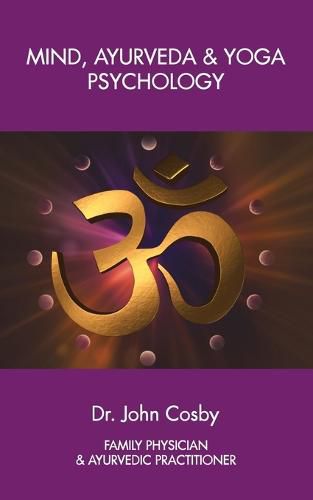Readings Newsletter
Become a Readings Member to make your shopping experience even easier.
Sign in or sign up for free!
You’re not far away from qualifying for FREE standard shipping within Australia
You’ve qualified for FREE standard shipping within Australia
The cart is loading…






This title is printed to order. This book may have been self-published. If so, we cannot guarantee the quality of the content. In the main most books will have gone through the editing process however some may not. We therefore suggest that you be aware of this before ordering this book. If in doubt check either the author or publisher’s details as we are unable to accept any returns unless they are faulty. Please contact us if you have any questions.
In the first part of this book, we will look at the foundational concepts of several yoga philosophies, especially pertaining to the nature of the mind. We will begin with the philosophy of Samkhya which explains the creation of the universe, enfoldment of cosmic consciousness, development of the individual soul, and to the rise of the operative faculties of the mind in perception, feeling, ego, memory and intelligence. In the second part, we will look at the tradition of yoga and its techniques to develop the aspirant to rise above physical and mental agitation and restraint which holds one back from emerging into higher knowledge of the self. In the third, we will look at the basic principles of ayurveda including its perspectives to establish balance and harmony of body and mental states. Through the universal principles of ayurveda, knowledge of one’s physical and mental constitution can lead to continuum of health and restoration of disease into a balance state of individuals. Its goal is to achieve equilibrium between body and mind by the use of a number of disciplines - diet, medicinal herbs, and detoxification and rejuvenator programs, breathe exercises, asanas, meditation, and lifestyle changes to maintain one’s body and mental type.
Ayurveda and Yogic traditions offer a profound and intuitive insight into the nature of mind, root cause of mental disease, mental afflictions, deep seated impression and subtle desire (vasana) which lead to mental bondage, unconscious (instinctive, habitual behavior), blockage in adversities, and unawareness in the play of misery and pain. Together, they can expunge mental impurities, transpire negativity, develop conscious awareness, control of thought movement, and sharpen concentration and meditation to bring about transparency into one’s true existence. Through the cultivation of yogic disciplines one can attain liberation or peace of mind through the actions of moral and righteous behavior (Yama and Niyama), selfless service (Karma yoga), devotional practices (Bhakti yoga), will and meditation disciplines (Raja Yoga) and intuitive knowledge (Jnana yoga). These are not interdependent of one another but collectively move one towards the goal of all yoga in the attainment of self realization.
$9.00 standard shipping within Australia
FREE standard shipping within Australia for orders over $100.00
Express & International shipping calculated at checkout
This title is printed to order. This book may have been self-published. If so, we cannot guarantee the quality of the content. In the main most books will have gone through the editing process however some may not. We therefore suggest that you be aware of this before ordering this book. If in doubt check either the author or publisher’s details as we are unable to accept any returns unless they are faulty. Please contact us if you have any questions.
In the first part of this book, we will look at the foundational concepts of several yoga philosophies, especially pertaining to the nature of the mind. We will begin with the philosophy of Samkhya which explains the creation of the universe, enfoldment of cosmic consciousness, development of the individual soul, and to the rise of the operative faculties of the mind in perception, feeling, ego, memory and intelligence. In the second part, we will look at the tradition of yoga and its techniques to develop the aspirant to rise above physical and mental agitation and restraint which holds one back from emerging into higher knowledge of the self. In the third, we will look at the basic principles of ayurveda including its perspectives to establish balance and harmony of body and mental states. Through the universal principles of ayurveda, knowledge of one’s physical and mental constitution can lead to continuum of health and restoration of disease into a balance state of individuals. Its goal is to achieve equilibrium between body and mind by the use of a number of disciplines - diet, medicinal herbs, and detoxification and rejuvenator programs, breathe exercises, asanas, meditation, and lifestyle changes to maintain one’s body and mental type.
Ayurveda and Yogic traditions offer a profound and intuitive insight into the nature of mind, root cause of mental disease, mental afflictions, deep seated impression and subtle desire (vasana) which lead to mental bondage, unconscious (instinctive, habitual behavior), blockage in adversities, and unawareness in the play of misery and pain. Together, they can expunge mental impurities, transpire negativity, develop conscious awareness, control of thought movement, and sharpen concentration and meditation to bring about transparency into one’s true existence. Through the cultivation of yogic disciplines one can attain liberation or peace of mind through the actions of moral and righteous behavior (Yama and Niyama), selfless service (Karma yoga), devotional practices (Bhakti yoga), will and meditation disciplines (Raja Yoga) and intuitive knowledge (Jnana yoga). These are not interdependent of one another but collectively move one towards the goal of all yoga in the attainment of self realization.